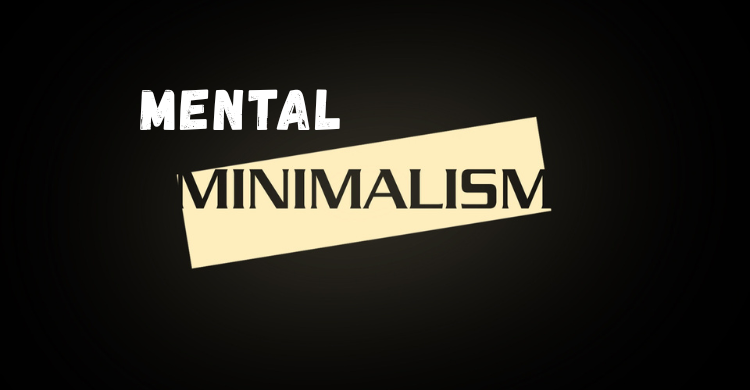Less is more- the minimalistic slogan. Do you think minimalism is only about having fewer possessions and slowing down? If you have taken space as literal, then this is more than just fewer things. Creating mental space is essential and difficult at the same time.
What is mental minimalism?
Mental minimalism is to create space in your thoughts, creating the same arrangement in your mind that you’d give to your well-organized minimalist home.
When the mind is always preoccupied with memories, thoughts, and tensions, there’s no space to focus or any better input. Your brain is quite notorious for being busy all the time unless you consciously teach it to be quiet. If you want to be a minimalist, start with decluttering thoughts.
Easier said than done, right? I know decluttering your space is much easier than decluttering your thoughts. But we can always try. Let’s start together, then-
Before starting,
What’s the benefit of mental minimalism?
Remember, mental decluttering is not emptying your mind of thoughts but to learn to take control of your thoughts.
Less anxious, more balance
You might have noticed that most of your time is spent either dwelling on the past or worrying about the future. Think, if you can actively control what you need to focus on at that time, won’t it save you from anxiety to a greater extent?
Focus on present, thrive productivity
Mental decluttering will increase your productivity on a light velocity, believe me. If you can be taught that the present is the number one priority, then your checklist is going to be completed in no time.
Strong emotional resilience
As you learn how to stop spiraling negative thoughts, you then become strong emotionally. You stop impulsive reactions and respond more intentionally.
Boosts creativity
Your brain is not jammed by different thoughts, then creativity obviously will get the space to enter. I sometimes sketch. I noticed that when I am stressed about anything, drawing even a straight line becomes impossible. But when my mind is calm, I can do creative work comfortably.
Better self awareness
All of our life, we observe others’ actions, like, dislike. Why? Because that helps us take action that will probably work in our favour. Have you done the same for yourself? Yes, that’s right. Mental minimalism will introduce you to yourself and improve your understanding.
Freedom from external validation
Once you know what’s important, this will detach you from FOMO. Independence from people-pleasing behaviour, anxiety, and inferiority will be your gain.
How to declutter your mind?
Start with MVP (Minimum viable progress)
To start with decluttering, having a doable mindset is the first step. I love the MVP approach. It’s actually a mindset that works in every sector.
I am inherently an overthinker. I have tried to remove negative thoughts before but failed every time. What’s wrong with my process? That I was trying to achieve an extremely difficult state of mind in a single step. What I should have done first was to observe the pattern of my overthinking. What is triggering my spiral of thoughts? What is in control and what is out of control?
Don’t overwhelm yourself; instead, try MVP. These tiny, baby steps will impact you unimaginably once you give them some time.
Instead of: I’ll go for a walk daily from now on.
MVP: Start 2-3 times a week first.
Instead of: I’ll fix my anxiety today.
MVP: Sit for several minutes to observe your thoughts first.
Input is equivalent to output
I read in a blog to beware of GIGO(Garbage In, Garbage Out) and embrace WIWO( Wisdom In, Wisdom Out). What amount of news will intact my sanity? Should I prioritize world knowledge about crimes and inhumanity or my mental peace? Am I just finding an escape by avoiding these accidents? These are my regular thoughts.
The debate never ends, but a part of me strongly believes that what I am consuming greatly impacts my thought process and emotions. No matter how strong a person emotionally gets, there’s a limit to emotional vulnerability. You might disagree with me, but social media and the digital world sometimes become a toxic place. Easy access to everything can take a toll on your mental health. Be conscious of what you consume. Rather than bombarding yourself with information that your mind can’t take easily, be easy with yourself.
Stop overcommitment
If you keep committing to everyone, you cannot fulfill all of them. You have 24 hours a day. Learning to say no is a step toward mental decluttering. A party you don’t want to attend but your friends are going to, so you have to as well. If you miss, then you might feel guilty of rejecting them. This type of situation is common. Start thinking about what you would prefer first. This will save you from burnout.
Practice creating “white space” in mind
Yoga, meditation, and exercise work best for a mental boost. Meditation like Trataka(candle gazing techniques) teaches you to create emptiness in the mind. In times of despair, the habit helps you to process the grief and gives healing power to regain control of life.
Keep a junk drawer to dump
Venting is necessary, but in a healthy way, of course. You have to have a place to healthily dump your jammed thoughts. It can be journaling, voice recording, maybe a talk with your bestie, or even a therapist if needed.
Find a way to get rid of your garbage thoughts. Let your mind organize the mess it creates over time. This technique works not only for negative thoughts but in creativity and ideas as well.
Writing them down or letting those out of the confined space often solves the problem without any effort. Find your junk drawer.
Consider your mind as someone you love dearly. What you would do to take care of your loved ones, do the same for your mind. Decluttering your mind is not just a minimalist lifestyle but absolutely essential for all. Take control of your mind.




